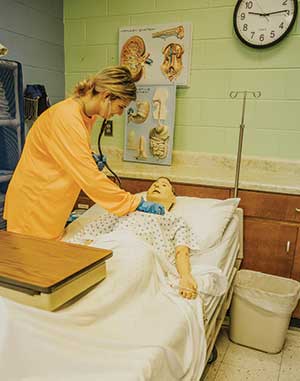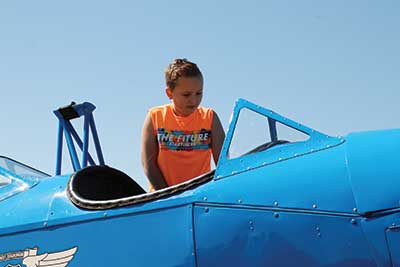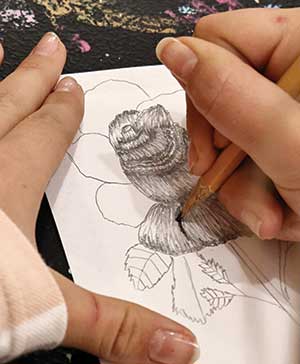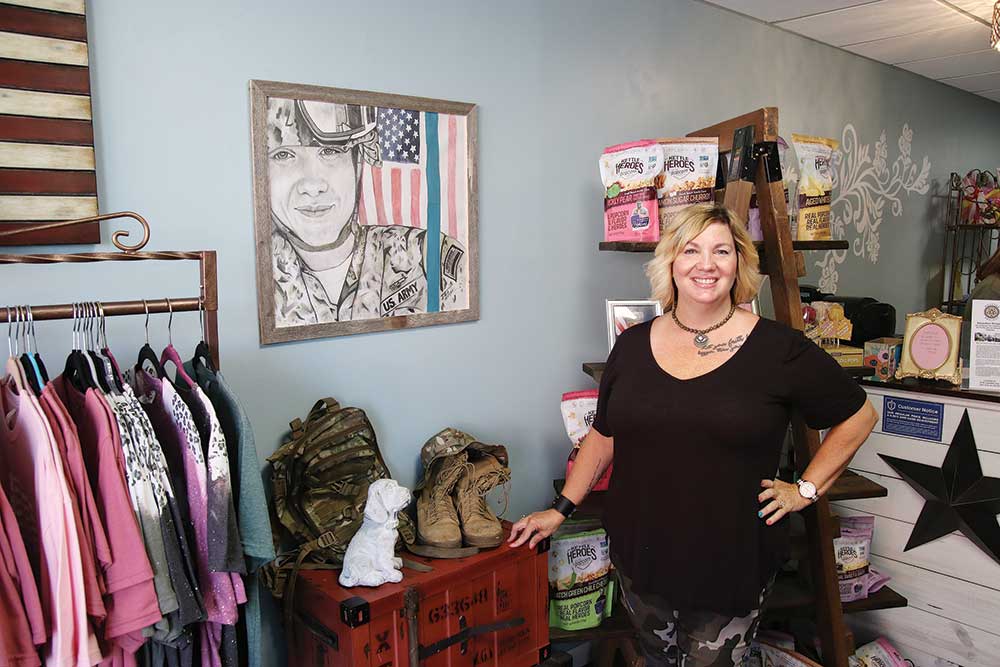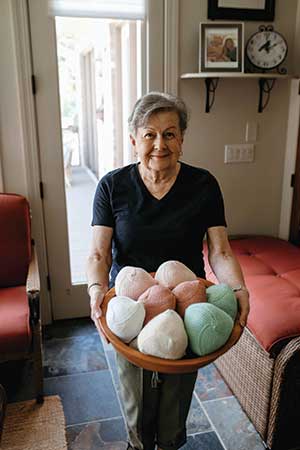St. Clair schools training for the future
Story by Elaine Hobson Miller
Photos by Mackenzie Free
It’s difficult not to notice the white letters E-C-T-C on the giant Adirondack chairs at the corner of U.S. 231 and U.S. 411 in Ashville. Perched on a hill overlooking the county’s only traffic roundabout, the chairs were built by carpentry students at Eden Career Technical Center to bring attention to their school.
Despite such high visibility, the school has been called “a hidden jewel” by its principal, and “the best-kept secret in St. Clair County” by one of its teachers. Neither knows why that’s true, but it’s something they both want to see changed.
“People don’t realize the opportunities we provide to learn skills that turn into jobs that they can make careers out of,” says Trisha Turner, career tech director for St. Clair County Schools and principal at ECTC since 2018.
Part of the county school system, ECTC is celebrating its 50th anniversary during this entire school year. It was named after its first principal, John Pope Eden, who lobbied for a vocational school for five years. Pope died in November of 1972, nine months before the school opened at the Ashville Armory in August of 1973 and 14 months before it moved to its permanent campus in January 1974. The school was officially dedicated to his honor in February 1975.
The tech school started with 360 students and four programs — cosmetology, masonry, plumbing and electricity — which are no longer offered. Courses have evolved through the years due to demand in the world of trades and technology. Today, enrollment is at 315.
“When school started in August of 1973, we went to the Armory in Ashville,” says Dorothy “Sis” Wilson, 80, who retired this past May after driving St. Clair County school buses for 55 years, including 50 for ECTC. “That’s where we started the vocational and trade school. Then we hauled kids to help build the new school, and that’s the reason the office, horticulture and air conditioner (HVAC) programs are in brick buildings. (The others are made of metal.) When we got out for Christmas holidays, Mr. Griffin (Thomas L.), principal, said when y’all come back in January come to the (new) vocational school. There are no brick masons there now, but they had one (study program) there for a while.”
Those first three brick buildings were completed and furnished for $500,000, with 70% of that amount coming from Appalachian Funds, 30% from local monies, including a $20,000 grant from the St. Clair County Commission, according to a Birmingham News article from the early 1970s. When Eden began dreaming about a trade and technical school, only 12% of the county’s high school graduates attended college, the article states. Only vocational agriculture (vo-ag) and home economics were offered to the other 88% at the high schools.
County schools now offer 14 different technical programs, according to Trisha Turner, career technical director for St. Clair County Schools and principal of ECTC. “Eleven are located here,” she says. “Agricultural Science and Family & Consumer Science programs are offered at each of the five high schools. JROTC is offered at St. Clair County High, Culinary is located on the Moody High School campus, and there is a business program at Moody, too.”
Programs on the ECTC campus include HVAC (heating and air), welding, carpentry, drafting, business information technology, information technology (IT), collision repair, automotive service, health science, plant & animal science, and emergency and fire management services. JROTC is located at St Clair County High School. The latter is not a military preparation course, but a program that promotes ethics, leadership and respect for business and industry, according to Turner, who calls business and industry “the driving force behind careers in tech programs.”
To attend ECTC, a student must be in the 10th-12th grades and enrolled in a high school in the St. Clair County School System. Students are on campus at ECTC for half a school day and at their high school the other half. They are bused back and forth by drivers employed by the county school system. The courses are considered elective high school classes, but they earn credentials and certifications that enable students to get paying jobs in their fields.
“Virtual or online high school students enrolled in the county’s Virtual Preparation Academy can choose to come here for a program or two with their own transportation or take a bus from their school, if they can get to their school,” Turner says.
Career Coach Christina Puckett says the goal at ECTC is for the students to be career-ready when they graduate. “We also offer dual enrollment in two areas,” she says. “We are paired with Gadsden State for automotive and drafting and with Jefferson State for welding and for child development. In other words, the students can get college credits here for these courses.”
The automotive service program includes everything about car maintenance and repairs, from engines to tires. The collision repair program trains students to repair damage and to refinish vehicles. “The need for automotive service technicians is growing rapidly as people continue to keep their vehicles in operation longer than ever before,” a brochure about the school states.
The ECTC campus now has six buildings, with two classes held in most of them. A seventh may be forthcoming if tentative plans to build a culinary building come to fruition. “Right now, the old Moody High School’s lunchroom, which was converted to accommodate the program, is being used,” Turner says. “Chef Melissa Allphin is in charge and her kids always win in state competitions.”
Most people don’t realize they can have something built by the school’s carpentry students, like a shooting house or a tiny house, for a price. “Our xarpentry program also covers a little electrical, plumbing and masonry. HVAC covers a little bit of electrical work, too,” Turner says. “Kevin Self heads our HVAC program, and he just got some equipment that will allow them to cut ductwork. He’s passionate about getting skilled workers because he sees the need in the HVAC company he owns.”
Self is one of four teachers at the school who are graduates of ECTC, according to Sis Wilson. The others include Marcus Graves, carpentry; Jeff Parrish, emergency & fire management services; and Roger Peace, collision repair, who got the same job his father retired from several years ago.
“We’re the best-kept secret in St. Clair County,” says Jeff Parrish, who started his career with ECTC night classes and began teaching there when he retired from 25 years with Pell City Fire and Rescue.
“I don’t know why” it should remain a secret, he says. Its merits are being discovered. Three state troopers visited his program recently looking for future recruits. “One trooper was from the State Bureau of Investigation, one from aviation (helicopter & fixed-wing division of state troopers) and the other was a trooper recruiter. They were pitching jobs. The Air Force visits our classes, too.”
The Health Science program, taught by Deanna Hartley, RN, and Amy Stephan, a nurse practitioner, trains students for their EKG (electrocardiogram) and CNA (certified nursing assistant) certifications and their BLS (Basic Life Support) instructor licenses.
“They can become monitor technicians for hospitals and can conduct stress tests, too,” says Turner. “They actually get practical experience that helps them decide what they really want to be. For example, some of them work in nursing homes and some decide that’s not for them. This saves the parents money on education, because kids sometimes change their minds about their careers after they’ve finished college or a trade school.”
Another feature that helps kids decide on a career is ECTC’s Summer Camp for students in sixth through eighth grades. Camp takes place from 8 a.m. to 12 p.m., for three days during Memorial Day week. Parents interested in enrolling their children may call the school at 205-594-2070.
The business information technology program is for students who want to pursue careers in business administration and management, whereas the Information Technology program is for those interested in careers involving information technology security, network analysis, planning and implementation, according to the ECTC brochure.
Noah Duke, a senior at St. Clair CountyHigh School who is enrolled in the IT program, was one of the guides explaining robotics to visitors at the school’s open house in the fall. “We participate in the BEST Robotics competition,” he says, noting that BEST stands for “Boosting Engineering Science and Technology.
Sponsored by Shelton State Community College, the multi-level competition has a different theme each year but always involves building a robot. “This year’s theme is Made2Order,” Duke says. His team built a long, wooden conveyor that the remote-controlled robot rolled on. As it moved, it picked up items and loaded them into a cart. Each team got one point for each item the robot successfully loaded, and the team with the most points won. ECTC’s team placed seventh out of 14 at the first level in Tuscaloosa in October.
“We are in the process of trying to begin a modern manufacturing program on campus, pending approval by the St. Clair County Board of Education,” Turner says. “If approved, it will be a partnership with the Alabama Region 4 Workforce, also known as the Central 6.”
The program will cater to the Honda plant in Lincoln and all the periphery manufacturing plants that supply it, and to the Mercedes plant near Tuscaloosa. “The state is divided into workforce regions, and we’re in Region 4, also known as Central 6 because it includes the six counties in the center of the state,” Turner says. “The goal is for every region to have a modern manufacturing program. We’re working with others in our region to develop this program. We hope to start it next school year.”
Career-oriented night classes for adults may be a part of the school’s future next year, too. Turner says they are applying for a grant that will provide for 12-week courses to train people to earn certificates and get jobs in welding, carpentry and HVAC systems. “The grant would enable us to provide courses for free, but some of my teachers want to start it and let people or their employers pay for it,” Turner says.
Joe Whitten, a local historian, was a friend of the school’s namesake. He says all who knew “Pope” were greatly saddened that he did not live to see his dream come true. “The reality of his dream has flourished through the years,” Whitten says. “I know if he could see it today, he would be joyful that he did not fight and labor in vain for a vocational school for the students of St Clair County.”













